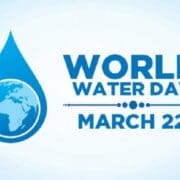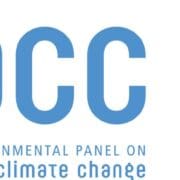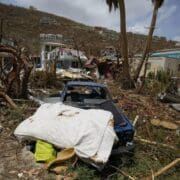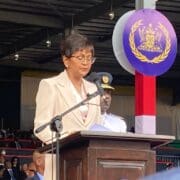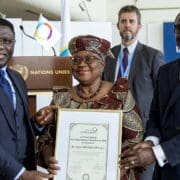Black Immigrant Daily News
Damage caused by Hurricane Irma in Road Town, on the British Virgin Island of Tortola. Caribbean leaders want larger countries to pick up the pace at which they are working to meet the climate change challenge and keep global warming from devastating whole countries. Courtesy: Russell Watkins/DFID
Humanity still has a chance, close to the last, to prevent the worst of climate change ‘s future harms, a top United Nations panel of scientists said Monday.
But doing so requires quickly slashing nearly two-thirds of carbon pollution by 2035, the Intergovernmental Panel on Climate Change said. The United Nations chief said it more bluntly, callingfor an end to new fossil fuel exploration and for rich countries to quit coal, oil and gas by 2040.
“Humanity is on thin ice — and that ice is melting fast,” United Nations Secretary-General Antonio Guterres said. “Our world needs climate action on all fronts — everything, everywhere, all atonce.”
Stepping up his pleas for action on fossil fuels, Guterres called for rich countries to accelerate their target for achieving net zero emissions to as early as 2040, and developing nations to aim for 2050 — about a decade earlier than most current targets. He also called for them to stop using coal by 2030 and 2040, respectively, and ensure carbon-free electricity generation in the developed world by 2035, meaning no gas-fired power plants either.
That date is key because nations soon have to come up with goals for pollution reduction by 2035, according to the Paris climate agreement. After contentious debate, the U.N. science report approved Sunday concluded that to stay under the warming limit set in Paris the world needs to cut 60% of its greenhouse gas emissions by 2035, compared with 2019, adding a new target not previously mentioned in six previous reports issued since 2018.
“The choices and actions implemented in this decade will have impacts for thousands of years,” the report, said calling climate change “a threat to human well-being and planetary health.”
“We are not on the right track but it’s not too late,” said report co-author and water scientist Aditi Mukherji. “Our intention is really a message of hope, and not that of doomsday.”
With the world only a few tenths of a degree away from the globally accepted goal of limiting warming to 1.5 degrees Celsius (2.7 degrees Fahrenheit) since pre-industrial times, scientists stressed a sense of urgency. The goal was adopted as part of the 2015 Paris climate agreement and the world has already warmed 1.1 degrees Celsius (2 degrees Fahrenheit).
This is likely the last warning the Nobel Peace Prize-winning collection of scientists will be able to make about the 1.5 mark because their next set of reports may well come after Earth has either breached the mark or is locked into exceeding it soon, several scientists, including report authors, told The AssociatedPress.
After 1.5 degrees “the risks are starting to pile on,” said report co-author Francis X. Johnson, a climate, land and policy scientist at the Stockholm Environment Institute. The report mentions “tipping points” around that temperature of species extinction, including coral reefs, irreversible melting of ice sheets and sea level rise on the order of several meters (several yards).
“1.5 is a critical critical limit, particularly for small islands and mountain (communities) which depend on glaciers,” said Mukherji, who’s also the climate change impact platform director at the research institute CGIAR.
“The window is closing if emissions are not reduced as quickly as possible,” Johnson said in an interview. “Scientists are rather alarmed.”
Many scientists, including at least three co-authors, said hitting 1.5 degrees is inevitable.
“We are pretty much locked into 1.5,” said report co-author Malte Meinshausen, a climate scientist at the University of Melbourne in Australia. “There’s very little way we will be able to avoid crossing 1.5 C sometime in the 2030s ” but the big issue is whether the temperature keeps rising from there or stabilizes.
Guterres insisted “the 1.5-degree limit is achievable.” Science panel chief Hoesung Lee said so far the world is far off course.
“This report confirms that if the current trends, current patterns of consumption and production continues, then … the global average 1.5 degrees temperature increase will be seen sometime in this decade,” Lee said.
Scientists emphasize that the world, civilization or humanity won’t end suddenly if and when Earth passes the 1.5 degree mark. Mukherji said “it’s not as if it’s a cliff that we all fall off.” But an earlier IPCC report detailed how the harms — from Arctic sea ice absent summers to even nastier extreme weather — are much worse beyond 1.5 degrees of warming.
“It is certainly prudent to be planning for a future that’s warmer than 1.5 degrees,” said IPCC report review editor Steven Rose, an economist at the Electric Power Research Institute in the United States.
If the world continues to use all the fossil fuel-powered infrastructure either existing now or proposed Earth will warm at least 2 degrees Celsius since pre-industrial times, the report said.
Because the report is based on data from a few years ago, the calculations about fossil fuel projects already in the pipeline do not include the increase in coal and natural gas use after Russia’s invasion of Ukraine. It comes a week after the Biden Administration in the United States approved the huge Willow oil-drilling project in Alaska, which could produce up to 180,000 barrels of oil a day.
The report and the underlying discussions also touch on the disparity between rich nations, which caused much of the problem because carbon dioxide emissions from industrialization stay in theair for more than a century, and poorer countries that get hit harder by extreme weather. Residents of poorer climate vulnerable nations are “up to 15 times more likely to die in floods, droughtsand storms,” Lee said.
If the world is to achieve its climate goals, poorer countries need a three-to-six times increase in financial help to adapt to a warmer world and switch to non-polluting energy, Lee said. Countrieshave made financial pledges and promises of a damage compensation fund.
The report offers hope if action is taken, using the word “opportunity” nine times in a 27-page summary. Though opportunity is overshadowed by 94 uses of the word “risk.”
“The pace and scale of what has been done so far and current plans are insufficient to tackle climate change,” IPCC chief Lee said. “We are walking when we should be sprinting.”
Lee said the panel doesn’t tell countries what to do to limit worse warming, adding “it’s up to each government to find the best solution.”
Activists also found grains of hope in the reports.
“The findings of these reports can make us feel disheartened about the slow pace of emissions reductions, the limited transition to renewable energy and the growing, daily impact of the climatecrisis on children,” said youth climate activist Vanessa Nakate, a goodwill ambassador for UNICEF. “But those children need us to read this report and take action, not lose hope.”
Peter Thorne, a researcher at the National University of Ireland in Maynooth and one of the report’s authors, said the responsibility for action rests with everyone.
“The reality is we at all levels — governments, communities, individuals — have made climate change somebody else’s problem,” he said. “We have to stop that.”
Donate At Caribbean News Service, we do not charge for our content and we want to keep it that way. We are seeking support from individuals and organisations so we can continue our work & develop CNS further.
NewsAmericasNow.com

